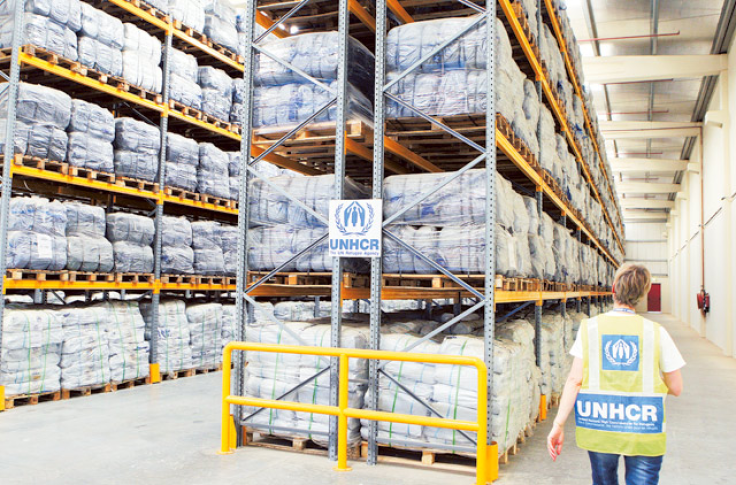Cross-Sector Collaboration Is Essential For Successful Humanitarian Projects
Globalisation is at the heart of how society functions today. From building diplomatic relationships to facilitating physical trade, the phrase 'no man is an island' has never been truer.
In this context, however, the global population has become increasingly vulnerable to environmental and health-related natural disasters, human conflict, and general instability:
The number of people in need of humanitarian assistance and protection has consistently risen since 2015, the first year the Global Humanitarian Review (GHR) was released.
On top of COVID-19, which impacts heavily on developing countries too, conflict- or climate change-induced food insecurity, poverty, and forced displacement continue to inflict misery on communities around the world. Between 2021 and 2022 alone, the number of those in need grew from 235 million to 274 million people, despite GHR's 2021 figure already being the highest in decades.

As humanitarian challenges grow in scale and complexity, solutions to these problems need to develop accordingly.
Spurred by the struggles of the pandemic, the importance of cross-sector collaboration is, at last, becoming the consensus amongst global decision-makers. At the local, national, and supranational levels, the past two years saw governments, NGOs, and the private sector coordinate their expertise and resources to distribute vaccines, PPE, food supplies and other essential goods.
More and more private sector organisations have recognised the role they can play in developing far-reaching, impactful, and innovative responses to the world's issues. In a 2020-2021 report, the Global Reporting Initiative (GRI) revealed that four out of five transnational corporations have made commitments to the United Nations' Sustainable Development Goals (SDGs).
In 2015, the European Parliament released a report which stated the private sector would also play a major role in filling the funding gap as traditional donations from institutions dwindled and humanitarian needs continued to grow.
Major corporations, including the likes of Deloitte, have utilised their extensive networks in business and academic institutions, pooling intellectual and financial resources to contribute to the humanitarian sector.
The global logistics company, DHL, provides forwarding and logistics services to humanitarian and public health sectors, delivering essential supplies to make emergency disaster response and longer-term development programmes function as efficiently as possible.
Yet, none of these private sector actors can solve the world's major crises alone – experts in the field know that a more joined-up approach is needed to bring the necessary resources and skillsets from across multiple sectors to bear.
A significant example of cross-sector collaboration is Dubai's International Humanitarian City (IHC), the world's largest international humanitarian hub and the only independent, humanitarian free-zone authority in operation.
Founded and supported by His Highness Sheikh Mohammed bin Rashid Al Maktoum, Vice-President and Prime Minister of the UAE and Ruler of Dubai, the organisation brings together established humanitarian institutions including the World Health Organisation (WHO), Office of the High Commissioner for Refugees (UNHCR), and the World Food Programme (WFP) with commercial companies, the likes of DHL Middle East, Alpinter, Aramex, and Kuehne + Nagel, that provide essential equipment and logistics.
As it is outfitted with extensive grounds and facilities, the 140,000 square-metre complex is also an appropriate base for numerous aid organisations, such as the International Federation of Red Cross and Red Crescent Societies (IFRC), Doctors without Borders (MSF), Smile Train, and the Fred Hollows Foundation.
The advantages of a large-scale, strategically located humanitarian hub with medical, logistics and supply capabilities were evident during the pandemic:
With partnerships developed over the course of nearly 20 years, the IHC was able to deliver 500 metric tonnes of emergency supplies. By June 2020, they were responsible for 85 per cent of the global supplies distributed in the WHO's emergency response.
The crisis in Ukraine, a major humanitarian catastrophe, unlocked an unprecedented amount of private sector support but has again highlighted the value of the IHC's more holistic, multi-stakeholder approach.
An emphasis on collaboration is ongoing in the IHC, most recently this year with DHL and Dubai South, allowing the organisation to continue making waves in the sphere of humanitarian operations and logistics.
Partnerships extend to higher education providers, as the IHC collaborates with the academic sector through the University of Wollongong and other institutions to fund scholarships and widen access to academic resources.
Private sector contributions, whether its information, goods or financing, are seemingly at their most useful when combined with the extensive expertise, networks and authority of humanitarian organisations and governments.
As long as humanity continues with globalisation, therefore, its support systems will have to follow suit, meaning that cross-sector collaboration is here to stay.











